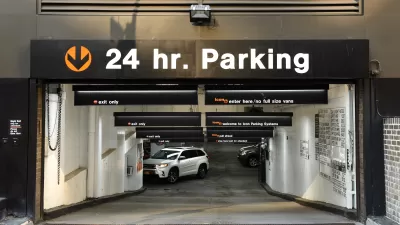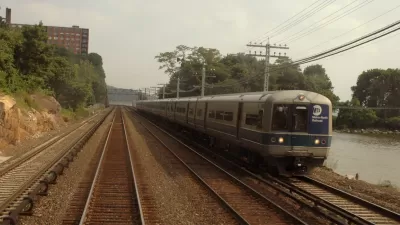A recent report that I coauthored, "Managing Transport Challenges When Oil Prices Rise" provides practical policy guidance on how to manage the risks of rising oil prices by increasing transport system efficiency. People with short attention spans might think that this report is already outdated, since global financial uncertainty has replaced rising fuel prices as the crisis-of-the-month. Leading businesses are bankrupt, employees are frightened, consumers are cautious, and fuel prices plummeting.
A recent report that I coauthored, "Managing Transport Challenges When Oil Prices Rise" provides practical policy guidance on how to manage the risks of rising oil prices by increasing transport system efficiency. People with short attention spans might think that this report is already outdated, since global financial uncertainty has replaced rising fuel prices as the crisis-of-the-month. Leading businesses are bankrupt, employees are frightened, consumers are cautious, and fuel prices plummeting.
So, what is the proper transportation policy response to the threat of a major recession? Consider some specific risks:
· Rising unemployment will cause reduced income and poverty for many households.
· Countries will struggle to be economically competitive.
· Nations that import resources such as petroleum face significant foreign exchange burdens as their exports decline.
The smart transportation policy response to these risks is to increase transport system efficiency and diversity by improving resource efficient modes (walking, cycling, ridesharing, public transit, telework), providing efficient incentives (efficient road and parking pricing, pay-as-you-drive vehicle insurance, carbon taxes, etc.), and implementing smart growth land use policies that create more accessible, multi-modal communities.
These are virtually the same responses recommended for rising fuel prices, climate change emission reductions, and local problems such as traffic congestion, traffic accidents, and local pollution. Yes, crises come and go, but the good transportation policy lives on.
This is because good transportation policy reflects basic market principles: consumer sovereignty (consumers have viable options from which to choose, including various modes, price options, service qualities, and locations), efficient pricing (the prices for each good reflect the full marginal costs of providing that good unless a subsidy is specifically justified), and economic neutrality (public investments, planning, regulations and taxes do not arbitrarily favor one good or activity over others). Current transportation policies are distorted in various ways that contradict these principles (as discussed in my article, Transportation Market Distortions, published in the Berkeley Planning Journal). Reforming these distortions benefits consumers, the economy and the environment.
Much of the conventional approach to transportation affordability involves shifting costs. Free roads and parking facilities, lower fuel prices, and "affordable" vehicle insurance rely on subsidies that impose costs elsewhere in the economy. For example, unpriced roads and parking, and low fuel taxes, impose costs on local governments and developers that we all pay through higher general taxes, higher housing costs, higher costs for retail goods, and reduced employee benefits (for employee parking), costs that consumers ultimately bear regardless of how much they drive. Low insurance premiums for higher-risk drivers require cross-subsidies from lower-risk drivers, and undercompensation of damages. These practices are all economically inefficient and inequitable.
True transportation affordability reduces rather than shifts costs. In particular, it provides convenient and comfortable walking and cycling conditions for local trips, high quality rideshare and public transit services for longer-distance trip, and telecommunications that can substitute for physical travel. It also means that affordable housing is located in accessible neighbourhoods, and commonly-used services and worksites are located in areas well served by public transit.
Transportation costs are a major financial burden to many households, due in large part to automobile dependency. Fiscally constrained households, for example, those struggling to pay mortgages or that have lost employment or investment income need affordable options. Our current transportation system fails to do this. According to the Consumer Expenditure Survey, in 2006 the average household spent $8,508 on personal transportation, mainly for automobile use, and this burden has probably increased since due to rising fuel prices. I can report from personal experience that large savings are possible. Our demographically average household (two adults, two children, a dog and a cat) spends less than $2,000 annually on local transportation because we own no car and rely on a combination of walking, cycling, public transit, taxi and carsharing. The savings are financing our older son's tuition at a major university. We also enjoy less stress, more exercise and more neighbourhood interaction due to these travel patterns. I only wish that other households could achieve these benefits.
Some critics may claim that efficient transportation is economically harmful because it reduces consumer expenditures on the large, fuel inefficient cars manufactured in North America. This reflects a profound misunderstanding about economic competitiveness and development. Yes, shifting from large automobiles to more fuel efficient vehicles and alternative modes will reduce a few automobile manufacturing jobs, but these are doomed anyway, and each inefficient vehicle purchased now burdens the economy with a large future fuel bills that will impose huge economic costs on consumers and the economy. Anybody who claims that America's economy benefits from the sale of gas guzzeling vehicles is looking decades backward, rather than forward into a high-fuel-priced future.
Now, more than ever, we need policies that reflect true economic efficiency. For guidance, see our new report cited above.

Alabama: Trump Terminates Settlements for Black Communities Harmed By Raw Sewage
Trump deemed the landmark civil rights agreement “illegal DEI and environmental justice policy.”

Study: Maui’s Plan to Convert Vacation Rentals to Long-Term Housing Could Cause Nearly $1 Billion Economic Loss
The plan would reduce visitor accommodation by 25% resulting in 1,900 jobs lost.

Planetizen Federal Action Tracker
A weekly monitor of how Trump’s orders and actions are impacting planners and planning in America.

Wind Energy on the Rise Despite Federal Policy Reversal
The Trump administration is revoking federal support for renewable energy, but demand for new projects continues unabated.

Passengers Flock to Caltrain After Electrification
The new electric trains are running faster and more reliably, leading to strong ridership growth on the Bay Area rail system.

Texas Churches Rally Behind ‘Yes in God’s Back Yard’ Legislation
Religious leaders want the state to reduce zoning regulations to streamline leasing church-owned land to housing developers.
Urban Design for Planners 1: Software Tools
This six-course series explores essential urban design concepts using open source software and equips planners with the tools they need to participate fully in the urban design process.
Planning for Universal Design
Learn the tools for implementing Universal Design in planning regulations.
Caltrans
Smith Gee Studio
Institute for Housing and Urban Development Studies (IHS)
City of Grandview
Harvard GSD Executive Education
Toledo-Lucas County Plan Commissions
Salt Lake City
NYU Wagner Graduate School of Public Service





























